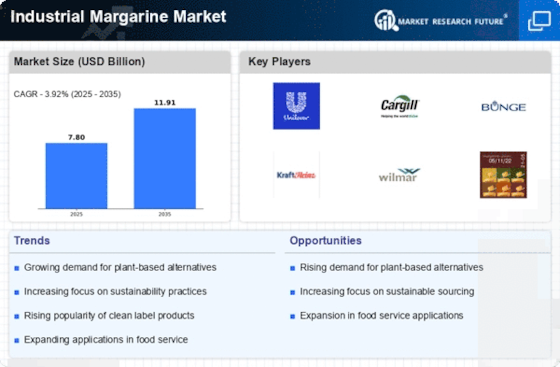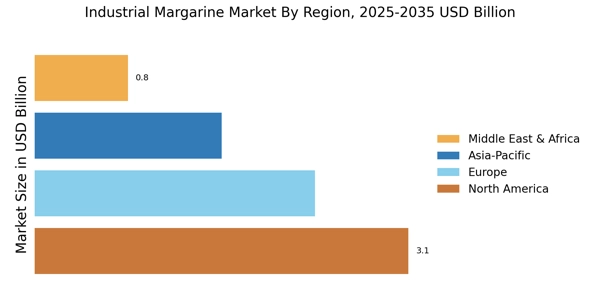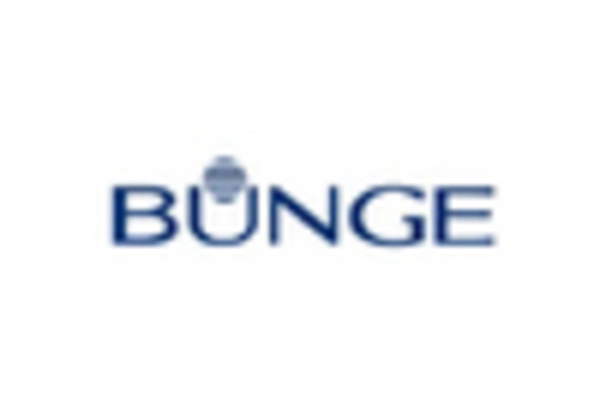Growth of the Bakery Sector
The Industrial Margarine Market is poised to benefit from the robust growth of the bakery sector. As consumer preferences shift towards baked goods, including bread, pastries, and cakes, the demand for industrial margarine as a key ingredient is likely to rise. Market analysis indicates that the bakery industry is expected to expand at a rate of 5% annually, driven by increasing consumption of artisanal and specialty baked products. Industrial margarine plays a vital role in achieving the desired texture and flavor in these products, making it indispensable for bakers. This growth trajectory suggests that the Industrial Margarine Market will continue to thrive as it aligns with the evolving trends in the bakery sector, providing essential ingredients that meet consumer expectations.
Innovations in Food Technology
Technological advancements in food processing are significantly influencing the Industrial Margarine Market. Innovations such as emulsification techniques and the development of healthier margarine formulations are becoming increasingly prevalent. These advancements allow manufacturers to create products that cater to health-conscious consumers while maintaining desirable taste and texture. For instance, the introduction of low-trans fat margarine options has gained traction, aligning with consumer preferences for healthier alternatives. Market data suggests that the demand for healthier margarine products is expected to rise, with a projected increase of 6% in the next few years. This trend indicates that the Industrial Margarine Market is adapting to evolving consumer needs, thereby enhancing its competitive edge in the food sector.
Expansion of Food Service Sector
The Industrial Margarine Market is experiencing growth due to the expansion of the food service sector. As restaurants, cafes, and catering services proliferate, the demand for industrial margarine as a cost-effective and versatile ingredient is increasing. This sector is projected to grow at a rate of 4% annually, driven by the rising popularity of dining out and food delivery services. Industrial margarine is favored for its ability to enhance flavor and texture in a variety of dishes, making it a staple in commercial kitchens. The growth of the food service sector suggests that the Industrial Margarine Market will continue to thrive, as it provides essential ingredients that meet the diverse needs of food service operators.
Rising Demand for Convenience Foods
The Industrial Margarine Market is experiencing a notable increase in demand for convenience foods, driven by changing consumer lifestyles. As more individuals seek quick meal solutions, manufacturers are responding by incorporating industrial margarine into ready-to-eat meals, snacks, and baked goods. This trend is reflected in market data, which indicates that the convenience food sector is projected to grow at a compound annual growth rate of approximately 4.5% over the next five years. Consequently, the Industrial Margarine Market is likely to benefit from this shift, as margarine serves as a versatile ingredient that enhances flavor and texture in various food products. The growing preference for on-the-go meals is expected to further propel the demand for industrial margarine, making it a crucial component in the food manufacturing process.
Sustainability and Ethical Sourcing
Sustainability initiatives are becoming increasingly important within the Industrial Margarine Market. Consumers are showing a growing preference for products that are ethically sourced and environmentally friendly. This shift is prompting manufacturers to adopt sustainable practices, such as using palm oil from certified sources and reducing carbon footprints in production processes. Market data indicates that the demand for sustainably produced margarine is on the rise, with a potential increase of 7% in consumer preference for eco-friendly products over the next few years. As sustainability becomes a key purchasing factor, the Industrial Margarine Market is likely to adapt by enhancing transparency in sourcing and production, thereby appealing to environmentally conscious consumers.


















